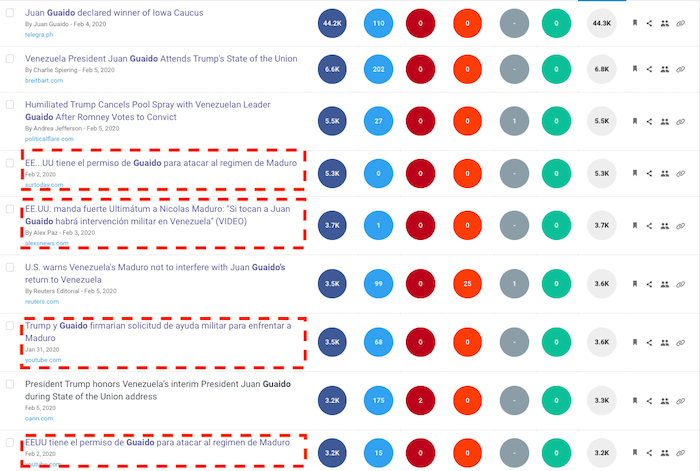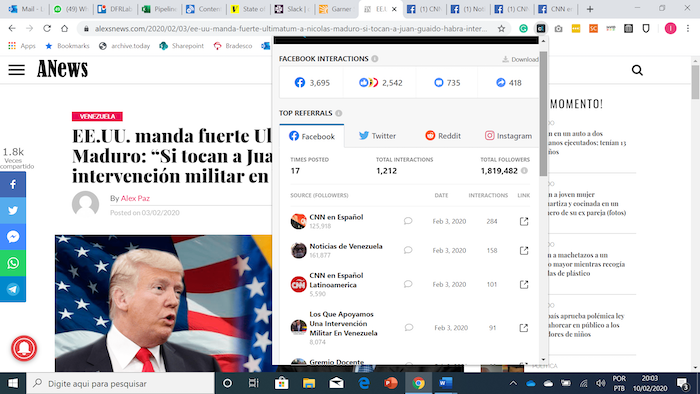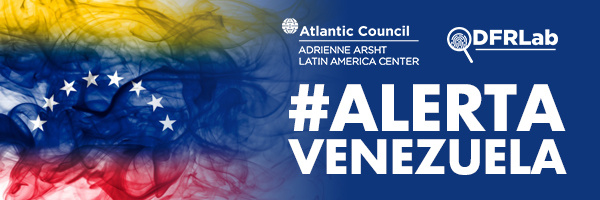#AlertaVenezuela is leading the way in identifying, exposing, and explaining disinformation within the context of one of the Western Hemisphere’s largest crises in recent history, where the fight for control of the information space will continue to pose a challenge for the region.
Top Story
Rumors about military intervention gain momentum
Rumors claiming that Juan Guaidó had given Donald Trump permission to lead a military intervention in Venezuela started to circulate while Guaidó was on an international tour to Europe and the Western Hemisphere. The claims amassed substantial engagement on social media, including a YouTube video that received more than 100,000 views.
The claim gained particular momentum while Guaidó was in the United States, where he appeared as one of President Donald Trump’s guests at the State of the Union Address on February 4, 2020, and where he also had a private meeting with the U.S. president.
The most-watched video pushing the false narrative claimed that Guaidó had given Trump permission to intervene in Venezuela. A video published by the YouTube channel “Parecen Noticias Extra” (“They Look Like News”) stated that “it is said” that Guaidó signed an agreement with Trump to allow the U.S. military to enter the country. The video additionally claimed that the final decision would be Trump’s and that Maduro was “on alert” because of the deal.

Although the video does not present evidence to support the claim, it garnered more than 100,000 views. The YouTube channel has 1.26 million subscribers, likely a result of its transition from being a popular Panamanian television program to YouTube as its exclusive outlet for content. Currently, the YouTube channel also publishes fact-based news about international topics, according to its description.
On Facebook, the video was shared by groups and pages, such as “Unidos por una Colombia Digna,” that support conservative policies and politicians such as former Colombian President Álvaro Uribe, as well as by a group supporting former Bolivian President Carlos Mesa.
The blog “Alex News” also published the claim that the United States had been given permission to intervene in Venezuela. Under the headline “U.S. sends strong ultimatum to Nicolas Maduro: ‘If you touch Juan Guaidó, there will be a military intervention in Venezuela,’” the website published a video featuring former U.S. ambassador for Venezuela William Brownfield. In the video, Brownfield said that the military option was not discarded.
The video, however, was taken out of context and manipulated and cannot be seen as representing the position of the United States government. The video has been circulating since May 2019 and had already been debunked by fact-checking organizations.
The Alex News article was published on Facebook groups such as “The ones that support a military intervention in Venezuela” and groups impersonating media outlets such as “CNN en Español” (CNN in Spanish) and “CNN in Spanish Latinoamerica.”

Talk of the Country
In the media
The monthly report “Enero: golpes a la información política” (“January: blows to political information”), published by the Venezuelan civil association Espacio Público on February 7, 2020, analyzed 28 cases linked to 110 violations of the right to freedom of speech in January 2020 in Venezuela. The independent organization explained, “the current context of the country [Venezuela] leads to recurrent free speech violations by the State as part of policies in which converge officials, institutions, and security forces […] The restrictive state policy uses mechanisms in moments of high political tension to intimidate, assault, censor, and detain journalists, citizens, and the media to impose a hegemony.” Espacio Público promotes and defends “human rights, especially freedom of speech; the right to information, and social responsibility in social media.”
On February 7, 2020, Colombian media website El Tiempo published “Uribe dice que Merlano fue ‘manipulada’ por el régimen de Maduro” (“Uribe says Merlano was ‘manipulated’ by the Maduro regime”). The publication garnered 56,100 interactions on Facebook and Twitter combined, according to BuzzSumo. The article gathered more engagement than other Venezuela-related articles published between February 3 and February 10, such as those that covered the State of the Union speech. El Tiempo’s article quoted former President of Colombia and current Congressperson Álvaro Uribe, who was defending his allies and members of the Colombian Centro Democratico party against accusations of corruption and an alleged plan to kill Aida Merlano, a former candidate for the Colombian congress who was arrested in Venezuela for having false documentation. The Uribe comments were in response to statements by Merlano, who declared on January 28 to the Venezuelan government that “everybody would fall with the evidence I have,” referring to Uribe’s allies and members of his party, including current Colombian President Iván Duque. Merlano, who is also a fugitive from Colombian justice, alleged that she has “videos, audios, written proofs, contracts, and tenders fixed” to support her declarations.
What’s Trending
On Social Media

Official Statements
“Mucho camino ha recorrido el bravo Pueblo Venezolano, hemos enfrentado a los imperios más poderosos y los hemos derrotado, hoy el imperio más inmoral de todos los tiempos pretende quebrar nuestra voluntad, no han podido ni podrán. Nosotros Venceremos!!”
“The brave Venezuelan People have traveled a long road, we have faced the most powerful empires, and we have defeated them, today the most immoral empire of all times aims to break our will, they have not been able and will not be able. We will win!” – Diosdado Cabello, president of the Constituent National Assembly and Maduro’s second-in-command, posted on his Twitter account on February 7. In addition to this post, Cabello tweeted again, one day later, against the “empires,” a word referring to the United States. These statements coincided with Guaidó’s visit to the United States.
“Hoy amanecimos en Hidroven, en Caracas el agua de las 168 horas semanales escasamente llega a los hogares 50 horas. Los venezolanos no somos camellos, la crisis en materia de agua potable es una de las más graves en el país #TodosMerecemosAgua.”
“Today we woke up in Hidroven [Hidrológica Venezolana, a state-owned enterprise operating mainly in the Water & Waste sector]. In Caracas, the water supply barely reaches the homes: only 50 hours out of the 168 per week are supplied. We Venezuelans are not camels, the crisis on drinking water is one of the most serious in the country. #EverybodyDeservesWater” – Juan Pablo Guanipa, the first vice president of the National Assembly, on Twitter on February 10. The representative lodged this complaint against the Maduro regime amid a crisis in infrastructure that has affected access to basic public services, including water and energy.
Our Team in the News
Around Russian Minister of Foreign Affairs Sergey Lavrov’s trip to Venezuela on Friday, February 7, Venezuela’s Correo de Carroni and independent outlet Tal Cual quoted the Adrienne Arsht Latin America Center regarding the country’s oil industry and Russia’s priorities in the country.
Also on Friday, February 7, the Adrienne Arsht Latin America Center held a discussion with Venezuelan National Assembly member Carlos Paparoni and Vanessa Neumann, ambassador to the United Kingdom for the interim government (as recognized by more than 50 countries), on the Maduro regime’s connections to Hezbollah and other irregular groups. The event was picked up by The Washington Times, independent outlet La Patilla in Venezuela, El Carabobeno, Noticiero Digital, and EVTV Miami, among others.
Recent Analyses
From the Adrienne Arsht Latin America Center: Following Guaidó’s appearance as a guest at the State of the Union on February 4, Jason Marczak, director of the Adrienne Arsht Latin America Center, and Diego Area, associate director of the Adrienne Arsht Latin America Center, shared their reactions in a New Atlanticist blog post published the same night.
Subscribe to the #AlertaVenezuela newsletter
To receive future editions of the #AlertaVenezuela newsletter each week, sign up below!
